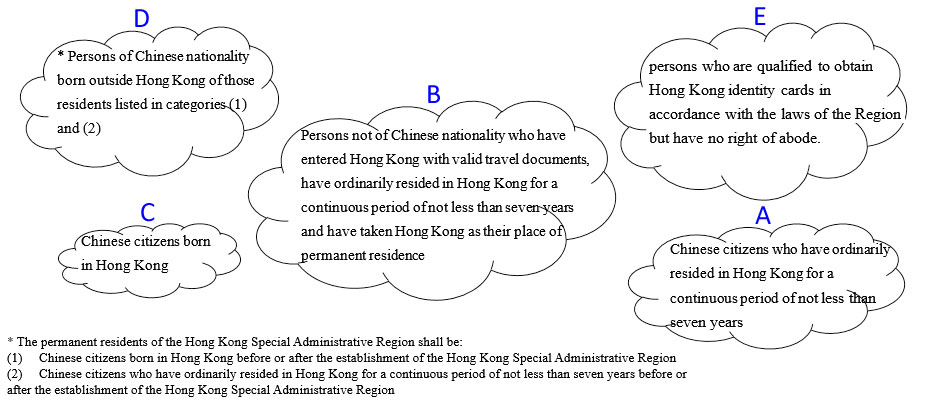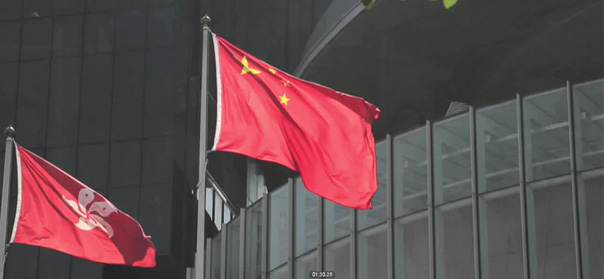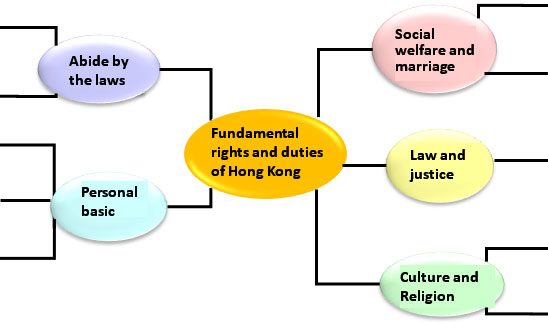| Basic Law |
Content of the articles |
| Concerning the legal and judicial aspect |
| Article 25 |
| All Hong Kong residents shall be equal before the law. |
|
| Article 35 |
| Hong Kong residents shall have the right to confidential legal advice, access to the courts, choice of lawyers for timely protection of their lawful rights and interests or for representation in the courts, and to judicial remedies. |
| Hong Kong residents shall have the right to institute legal proceedings in the courts against the acts of the executive authorities and their personnel. |
|
| Concerning the right to vote and the right stand for election aspect |
| Article 26 |
| Permanent residents of the Hong Kong Special Administrative Region shall have the right to vote and the right to stand for election in accordance with law. |
|
| Concerning the right and freedom to express opinions aspect |
| Article 27 |
| Hong Kong residents shall have freedom of speech, of the press and of publication; freedom of association, of assembly, of procession and of demonstration; and the right and freedom to form and join trade unions, and to strike. |
|
| Concerning the personal aspect |
| Article 28 |
| The freedom of the person of Hong Kong residents shall be inviolable. |
| No Hong Kong resident shall be subjected to arbitrary or unlawful arrest, detention or imprisonment. Arbitrary or unlawful search of the body of any resident or deprivation or restriction of the freedom of the person shall be prohibited. Torture of any resident or arbitrary or unlawful deprivation of the life of any resident shall be prohibited. |
|
| Article 29 |
| The homes and other premises of Hong Kong residents shall be inviolable. Arbitrary or unlawful search of, or intrusion into, a resident's home or other premises shall be prohibited. |
|
| Article 30 |
| The freedom and privacy of communication of Hong Kong residents shall be protected by law. No department or individual may, on any grounds, infringe upon the freedom and privacy of communication of residents except that the relevant authorities may inspect communication in accordance with legal procedures to meet the needs of public security or of investigation into criminal offences. |
|
| Article 31 |
| Hong Kong residents shall have freedom of movement within the Hong Kong Special Administrative Region and freedom of emigration to other countries and regions. They shall have freedom to travel and to enter or leave the Region. Unless restrained by law, holders of valid travel documents shall be free to leave the Region without special authorization. |
|
| Article 33 |
| Hong Kong residents shall have freedom of choice of occupation. |
|
| Concerning the conscience aspect |
| Article 32 |
| Hong Kong residents shall have freedom of conscience. |
| Hong Kong residents shall have freedom of religious belief and freedom to preach and to conduct and participate in religious activities in public. |
|
| Concerning the property rights aspect |
| Article 6 |
| The Hong Kong Special Administrative Region shall protect the right of private ownership of property in accordance with law. |
|
| Article 105 |
| The Hong Kong Special Administrative Region shall, in accordance with law, protect the right of individuals and legal persons to the acquisition, use, disposal and inheritance of property and their right to compensation for lawful deprivation of their property. |
| Such compensation shall correspond to the real value of the property concerned at the time and shall be freely convertible and paid without undue delay. |
| The ownership of enterprises and the investments from outside the Region shall be protected by law. |
|
| Concerning the social welfare aspect and freedom of marriage |
| Article 36 |
| Hong Kong residents shall have the right to social welfare in accordance with law. The welfare benefits and retirement security of the labour force shall be protected by law. |
|
| Article 37 |
| The freedom of marriage of Hong Kong residents and their right to raise a family freely shall be protected by law. |
|
| Concerning the educational and cultural aspect |
| Article 34 |
| Hong Kong residents shall have freedom to engage in academic research, literary and artistic creation, and other cultural activities. |
|
| Article 136 |
| On the basis of the previous educational system, the Government of the Hong Kong Special Administrative Region shall, on its own, formulate policies on the development and improvement of education, including policies regarding the educational system and its administration, the language of instruction, the allocation of funds, the examination system, the system of academic awards and the recognition of educational qualifications. |
| Community organizations and individuals may, in accordance with law, run educational undertakings of various kinds in the Hong Kong Special Administrative Region. |
|
| Article 137 |
| Educational institutions of all kinds may retain their autonomy and enjoy academic freedom. They may continue to recruit staff and use teaching materials from outside the Hong Kong Special Administrative Region. Schools run by religious organizations may continue to provide religious education, including courses in religion. |
| Students shall enjoy freedom of choice of educational institutions and freedom to pursue their education outside the Hong Kong Special Administrative Region. |
|
| Concerning the other rights and freedoms safeguarded by the laws of the HKSAR |
| Article 4 |
| The Hong Kong Special Administrative Region shall safeguard the rights and freedoms of the residents of the Hong Kong Special Administrative Region and of other persons in the Region in accordance with law. |
|
| Article 38 |
| Hong Kong residents shall enjoy the other rights and freedoms safeguarded by the laws of the Hong Kong Special Administrative Region. |
|
| Article 39 |
| The provisions of the International Covenant on Civil and Political Rights, the International Covenant on Economic, Social and Cultural Rights, and international labour conventions as applied to Hong Kong shall remain in force and shall be implemented through the laws of the Hong Kong Special Administrative Region. |
| The rights and freedoms enjoyed by Hong Kong residents shall not be restricted unless as prescribed by law. Such restrictions shall not contravene the provisions of the preceding paragraph of this Article. |
|
| Article 40 |
| The lawful traditional rights and interests of the indigenous inhabitants of the "New Territories" shall be protected by the Hong Kong Special Administrative Region. |
|













